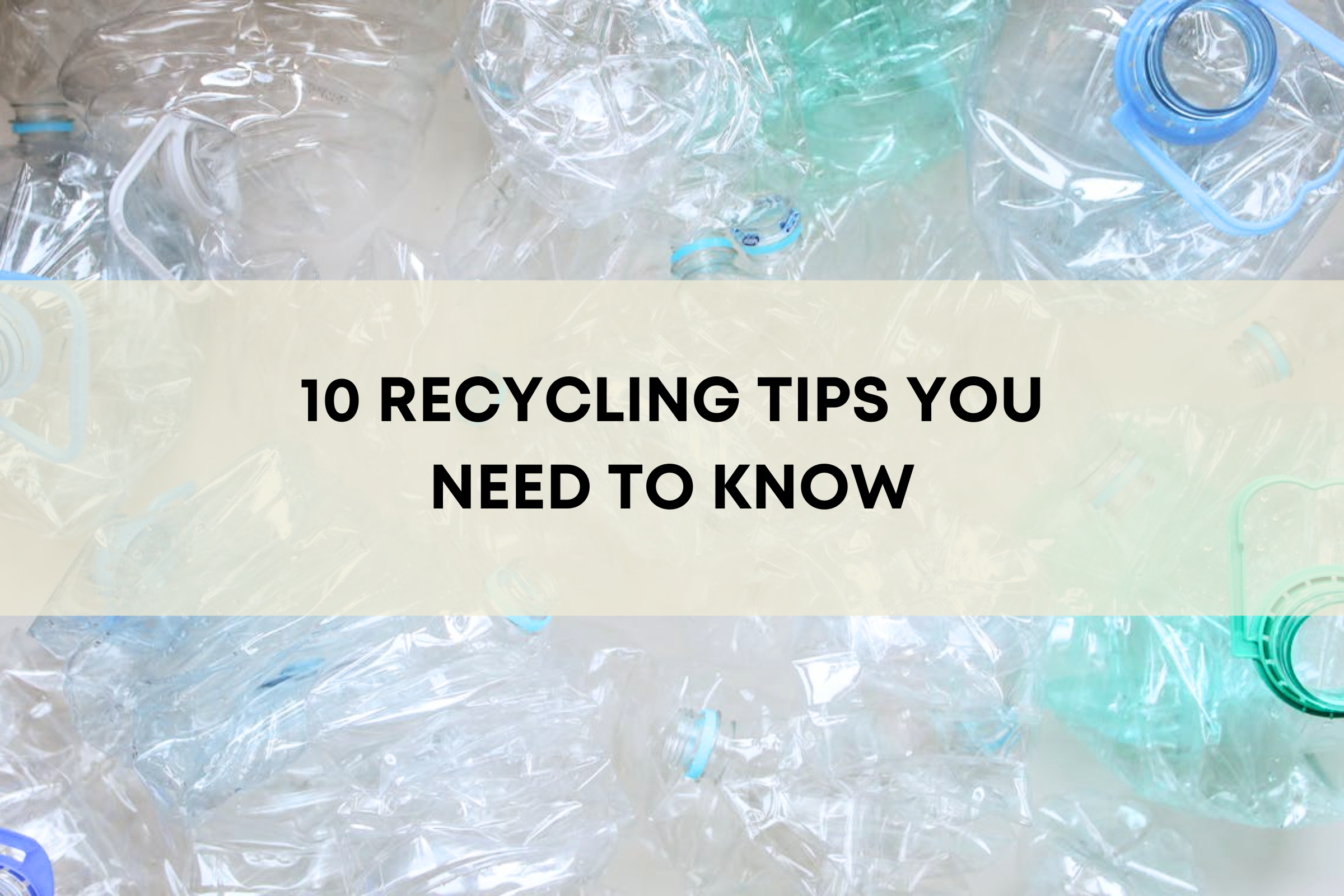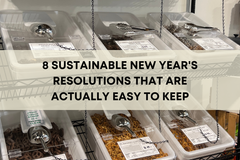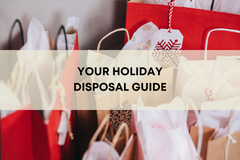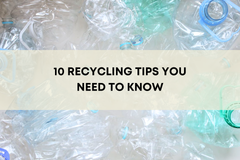10 Recycling Tips You Need To Know

Recycling isn’t just something we do, it’s a powerful act of protection for our planet, our communities and our future. Every day in the U.S., we generate millions of tons of waste that could be transformed into something new instead of filling landfills. According to the EPA, recycling and composting of municipal solid waste saved over 193 million metric tons of CO2 equivalent in 2018 alone. (1) That’s the same as removing nearly 42 million cars from the road for a year.
By recycling our materials, we create a healthier planet for ourselves and future generations by:
-
Conserving natural resources: recycling reduces the need to extract resources such as timber, water and minerals for new products.
-
Reduce greenhouse gas emissions: recycling or composting trash reduces greenhouse gas emissions.
-
Energy savings: recycling conserves energy — for example, recycling just 10 plastic bottles saves enough energy to power a laptop for more than 25 hours.
-
Waste and pollution reduction: recycling helps to divert waste away from landfills and incinerators, which in turn reduces pollution and emissions.
Yet, despite the potential that recycling can have on the planet, the national recycling rate in 2018 was only about 32%. (2) Even more striking, a recent study found that only 21% of materials that could be recycled are actually captured at the household level, which means there’s 79% of household recyclables that are entering the landfill instead. (3)
That means, there’s a lot of room for improvement and that’s where you come in! Every city is different, so there is no one set rule for recycling. It’s incredibly important for you to be informed and check what your county accepts before you put it in your recycling bin. The following 10 tips can help you recycle smarter, reduce contamination, and make sure what you place in your bin actually gets recycled.
1. Don’t crush cans or bottles before recycling
You may think you’re saving space by flattening your cans, water bottles, or cartons, but most modern recycling systems, especially single-stream systems, are actually designed to identify intact cans, bottles or containers in their original shape. According to the Aluminum Association, a crushed can can be harder for the sorting machine to detect, which means it may end up in the wrong stream or rejected altogether. (4)
So, whenever possible, keep recyclables like cans, plastic bottles, and cartons in their original shape.

2. Keep caps on plastic bottles and containers
We often see caps removed before recycling, but many programs now actually recommend that you re-attach the cap before throwing the container in your recycling. Several studies show that plastic bottle caps and lids are among the most common items found as litter or mis-disposed waste. That’s because these caps can be recycled when they are attached, but when they enter the recycling center loose, these caps can fall through the sorting machine and get rejected because they are too small and lightweight.
Keeping caps and lids attached to the container helps ensure both parts reach recycling rather than ending up in the environment. Rinse your container or bottle, replace the cap, and then toss the whole item into your recycling.
3. Rule of thumb: nothing smaller than a credit card
Just as you can’t recycle plastic caps loose by themselves, your rule of thumb should be to avoid recycling loose items smaller than a credit card. Items smaller than a credit card, such as bottle caps, straws, plastic utensils, etc. are too small for most automated sorting machinery and often fall through the belts or screens and end up as residue in the landfill. Because of this, the best practice is: if an item is smaller than a credit card, it likely does not belong in the recycling bin. Instead, reuse it if possible or find an alternative recycling option.
4. Exclude plastic bag, and don’t bag your recyclables
Plastic bags and other types of film plastic bags might appear similar to other plastics, or have a recycling symbol on them, but they cannot be recycled in your curbside bins and cause a huge headache for recycling facilities. Flexible plastic like this gets tangled in sorting equipment, slows down the process, and can even disable machinery. This is why most municipal curbside programs explicitly exclude plastic bags as an accepted item.
So, do not bag your recyclables and keep plastic bags and film out of your bin. Instead, collect these and recycle at store drop-off bins (usually at grocery stores, large retailers) or reuse at home.
5. Rinse your containers lightly!
Clean and empty containers make a huge difference in what can actually be recycled. Food residue, liquids, grease or sticky buildups can cause contamination of the entire stream, which can cause rejection of an entire batch. Roughly 25% of items placed in recycling bins are contaminated or non-recyclable, meaning 1 in 4 items may disrupt the recycling stream. (5) So, if you’ve got the chance, quickly rinse off your recyclables before placing them into your recycling bin!
6. Make sure it’s empty
Related to rinsing your containers, ensure your containers are completely empty! When containers are still half-full or contain leftover liquid, they pose a risk for the recycling system. A little bit of leftover food or liquid isn’t just negligible, it can compromise the recycling load.
7. Flatten your cardboard boxes
Cardboard is one of the most widely accepted and recycled item, but it still needs proper prep. Flattening boxes saves space in your bin, makes transport more efficient, and also helps the sorting machine recognize the cardboard more easily. While the “no crushing” rule applies to cans and other containers, flattening cardboard can be beneficial.
Collapse boxes so they lay flat and stack them. If you’ve got too many to fit in your curbside bin, place your flattened cardboard neatly into an intact cardboard box and place next to your curbside bin for collection.

8. Anything that powers shouldn’t go in your recycling bin
If it plugs in, lights up or runs on batteries, it doesn’t belong in our curbside recycling bin. Electronics, appliances, toys or tools with cords or internal batteries contain complex materials like lithium, copper, and circuit boards that cannot be processed at standard recycling facilities. In fact, batteries are one of the leading causes of recycling-facility fires nationwide. (6)
But that doesn’t mean these items are trash. Many communities have dedicated electronics recycling centers or drop-off events that safely recover valuable materials while properly handling hazardous components. These programs may charge a small fee per pound, but the cost ensures items are responsibly dismantled and recycled. To make the biggest impact, gather your unwanted electronics in one spot at home and plan a quarterly drop-off.
9. No greasy pizza boxes
A favorite meal—but a weak recycling candidate when grease and food residue are soaked into it. Pizza boxes contaminated with oils, cheese, sauce and other food refuse cannot always be recycled. The oils interfere with the paper pulping process and degrade the quality of the end recycled material. So, if you can clearly see that your pizza box has grease stains or food left on it, we recommend separating off the soiled portions to be composted, and recycle the clean portions.
10. Check your local guidelines
This is perhaps the most important tip we can give! Recycling rules vary significantly by city, county, and waste-hauler. What’s accepted in one program might not be in another. Some may accept certain numbers of plastics, others may not. Some may allow film plastics, some may not. Because of these differences, it’s always important to look up your local recycling “do’s & don’ts” (often available on your city or hauler’s website) rather than assuming universal rules apply. According to multiple sources, confusion about local rules is a major source of contamination.
If you live in the Twin Cities, we’ve pulled together a quick list of recycling rules by county:
You can simply search for “[County Name] Recycling Rules” and find what your city accepts.

At the end of the day, recycling isn’t just about throwing things away the right away, it’s about closing the loop, conserving resources and building an economy that values reuse over waste. Even if something isn’t accepted in your curbside bin, it doesn’t mean you should automatically trash it — we highly encourage you to take a look at alternative recycling opportunities and drop-offs in your community to further lessen what you’re sending to the landfill.
For example, here at Tare Market, we have a Recycling Corner with a number of different recycling bins for items that are hard-to-recycle in your curbside bins. From plastic cards (yes, like gift cards!) to candy and snack wrappers, snack pouches, and toothbrushes, we’re proud to be able to offer these recycling bins to keep more items out of the landfill. Check out our page here for what we’re currently accepting. We highly recommend checking local refill shops and reuse shops for recycling opportunities!
Sources:
-
https://www.marc.org/news/environment/contamination-cant-be-recycled?
-
https://www.epa.gov/system/files/documents/2021-08/lithium-ion-battery-report-update-7.01_508.pdf
Recent Blog Posts
Discover more tips on living #ZeroWaste!
-

8 Sustainable New Year's Resolutions That Are Actually Easy To Keep
Sustainable New Year’s resolutions don’t have to be overwhelming. These 8 simple, realistic habits make it easier to reduce waste, shop more intentionally, and build low-waste r...
Read more -

Your Holiday Disposal Guide
The holidays can generate a lot of extra waste, but much of it doesn’t need to end up in the landfill. This holiday disposal guide breaks down what can be recycled, composted, r...
Read more -

10 Recycling Tips You Need To Know
Recycling can be simple, but small mistakes can contaminate your recyclables and reduce their impact. In this guide, we share 10 practical tips to help you recycle smarter, from...
Read more




